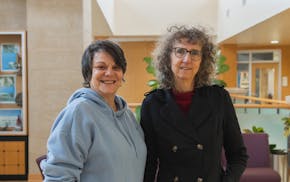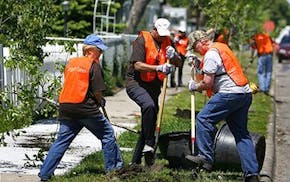Lorna Landvik wrote her first novel in longhand while sitting in the Nokomis Public Library, snapping the completed pages into a three-ring binder at the end of each day. Ballantine Books bought "Patty Jane's House of Curl," which became a best-seller. They've been her publisher ever since.
But Ballantine turned down her latest novel, saying it wasn't a "Lorna Landvik book" (perhaps because one character is from outer space). So Landvik took a deep breath and decided to publish it herself.
The attention in recent years has been on newbie writers turning to self-publishing in hopes of landing a real book contract. But in a quiet twist, some established authors are now turning away from New York and experimenting with alternative forms of publishing -- self-publishing, and digital-only books -- as a way to make more money, maintain control, or just stay viable.
Landvik and other Minnesota writers are following a trend that began with a few blockbuster authors -- Stephen King has dabbled in this, releasing short stories as Kindle Singles while continuing to publish the traditional way. Barry Eisler has embraced it, turning down a $500,000 advance from his publisher in order to do everything himself -- and keep all the profits.
"It's a good time to be an author," said Jim Milliot, co-editorial director of Publishers Weekly, an industry trade journal. "You do have a lot of choices. If you think your publisher is screwing you, you can just do it yourself."
It's easy, but will it pay?
The rapid, monumental changes in the book industry have made publishers more cautious. "They're doing fewer print titles, and they're doing fewer copies of those titles," Milliot said. "So a lot of authors are going to [self-publishing], and a lot of literary agents have set up arms to help authors publish their books digitally."
Landvik and Ballantine have not parted ways; she's working on two books for them. But her new book, "The Mayor of the Universe," a Walter Mitty-esque tale about a dreamy actuary, will be self-published through the website bookbaby.com.
"It's a whole new world, and believe me, I was completely happy with the old one," Landvik said. "I'm a traditionalist, and I love my bookstores and books and libraries. And then, oh, this cyberworld happened, and here I am."
Bookbaby fees start at $99 and climb to nearly $5,000. Landvik chose the $249 package and paid a consultant $800 to do formatting and design. Bookbaby will make her book available on all platforms -- not just through Amazon, but through Google and Nook and Kobo and other places on the Web. As publisher, Landvik pays for everything herself. She will also keep the bulk of the profits.
"This is the thing that people are so excited about -- you get 70 percent of what is sold," she said. "And in traditional publishing your royalties begin at 15 percent. They bump up, but nowhere near 70 percent."
While it's true that with self-publishing the royalty percentage is higher, it's also true that the take might be lower. E-books cost much less than print books, Milliot pointed out. A traditionally published hardcover book usually sells for around $25. Fifteen percent is $3.75. "A Kindle Single is 99 cents," Milliot said. "Seventy percent of 99 cents is 69 cents."
Stay in print forever
Twin Cities writer David Housewright sees great potential in e-books. He continues to publish new mysteries with St. Martin's Press/Minotaur, but he is also bringing out his backlisted book as e-books through mysteriouspress.com.
"Once the print run is over, publishers debate over whether or not they want to go into a second printing, and more often than not they won't, so they'll let the books go out of print," he said. "But now because of e-books, theoretically they can stay in print forever."
Housewright is also working with Down and Out Books, a Florida e-book publisher, on new books -- a thriller he co-wrote with his wife, and a young-adult mystery.
Still, he has no interest in self-publishing and worries that the flood of substandard self-published books is creating a backlash. "You have to be dedicated to the craft of writing," he said. "I don' t think doing straight e-books answers that. You don't get better. There isn't an editor, an agent or a line editor to go through the books with a very fine-tooth comb to massage it into something that is of high quality. Instead, you have people who think the first draft of whatever they put down is good stuff."
How will anyone see them?
Big New York publishers have big marketing machines, which smaller publishers don't have and which self-published authors can only dream of.
With the hundreds of thousands of e-books out there, it's hard for authors -- even those who are well-known -- to get attention. Each book is a drop in an ocean of books.
"Discoverability is the question of the hour," Milliot said. "That's what publishers are still good at doing. If you have a new title out, they will put together some sort of tour. They'll get you some ink, they'll get you some reviews. That certainly is the key. No matter how good a book is, unless somebody knows it's out there it doesn't do you much good."
Landvik says she was one of the "odd writers" who enjoyed book tours. "I really loved my publisher, loved all of the perks of having a publisher," she said. "I've been so slow to come to cyber promotion. For a girl who was raised Norwegian Lutheran, it's very hard to be a self-promoter."
She now has an author page on Facebook and a website. "I had a lot of success through booksellers' word of mouth and readers' word of mouth, so I'm hoping that there's a word-of-mouth community in the cyberworld. It's a huge, strange world, and I feel like I'd better be armed for it."
Christopher Lincoln, the Twin Cities author of middle-school books about a little skeleton boy named Billy Bones, is counting on Facebook, YouTube and Twitter to help sell his two self-published books designed for the iPad and other tablets.
Lincoln wrote and illustrated "The Shadow's Glow" mainly as an experiment, to see how difficult it would be to weave text around illustrations. With typical e-books, words are on one page, illustrations on another. But Lincoln wanted pages that combined the two, "Just like books were being done 20 years ago," he said.
He self-published "Bangabout Bits: Adventures of a Clockwork Boy," because its large number of color illustrations made it too expensive for traditional publishers.
He knows it's quite possible that no one will ever see either book.
"There are huge limitations as far as sales go," Lincoln said. "iTunes is not Amazon, and not that many kids have an iPad, either. I just have this need to get these out in the real world and kind of move on. The freelance editor that I used, and the copy editor I used will see more profit than I will. It's totally a labor of love."
Laurie Hertzel • 612-673-7302

Yuen: Why do people forgive? It's messy, complex and 'the best form of self-interest'
How the Goo Goo Dolls learned the music biz from Minneapolis bands
